The 5 Best Enterprise VPN Solutions
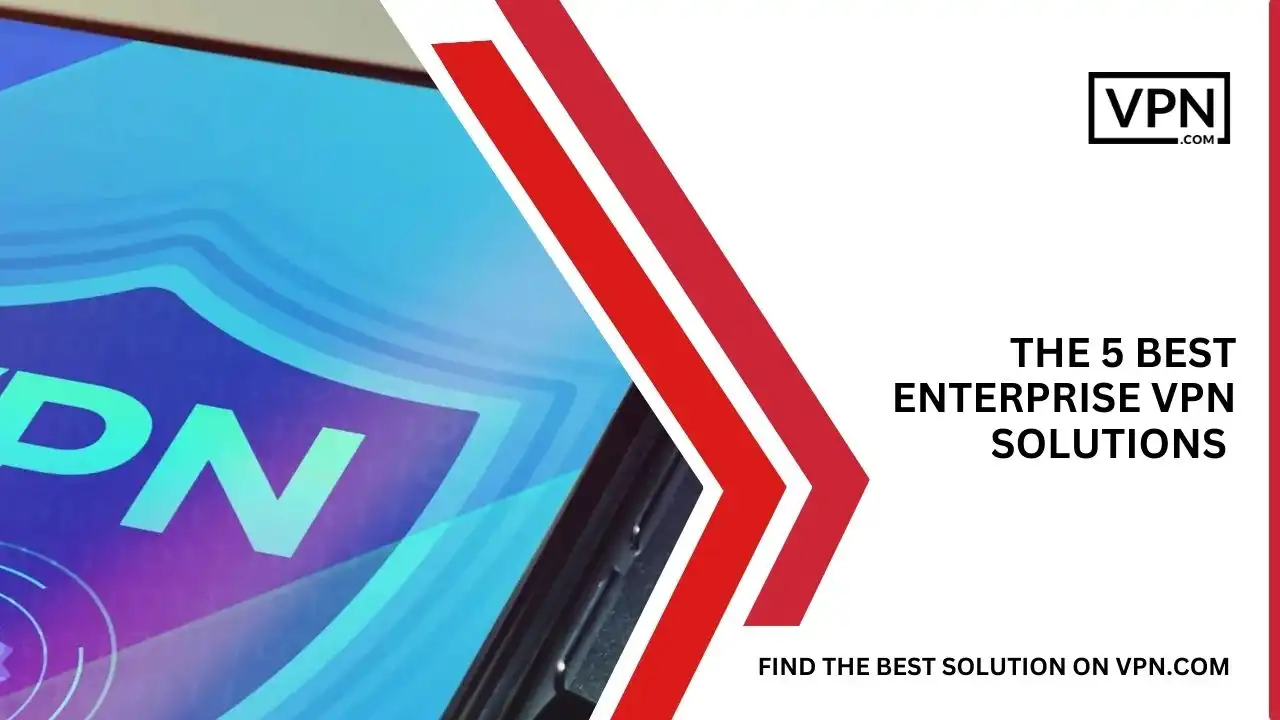
These days the folks with the biggest headaches are business owners. They ensure that no one’s privacy is violated while allowing them to safely access the company’s digital world.
According to a study by Aricent IBM, the average cost of data leakage in 2022 was about $4.35 million. You did read that correctly. This is why many businesses are prioritizing their purchases of enterprise VPN solutions.
Think of an enterprise as a digital drawbridge. It is going to offer a safer and more encrypted pathway for teams. They can use these paths to reach the company’s digital palace. It is the same as placing your internet traffic in an armored vehicle.
It makes it tough for scammers to get a peek at your personal data. However, VPN is a solid step towards online security. You always have the game in your hands.
There are plenty of options for VPNs out there. This is why to help you find the best VPN we have narrowed down 5 best enterprise VPN solutions for August 2023. So keep reading if you don’t want to miss anything important.
What Is Enterprise VPN?
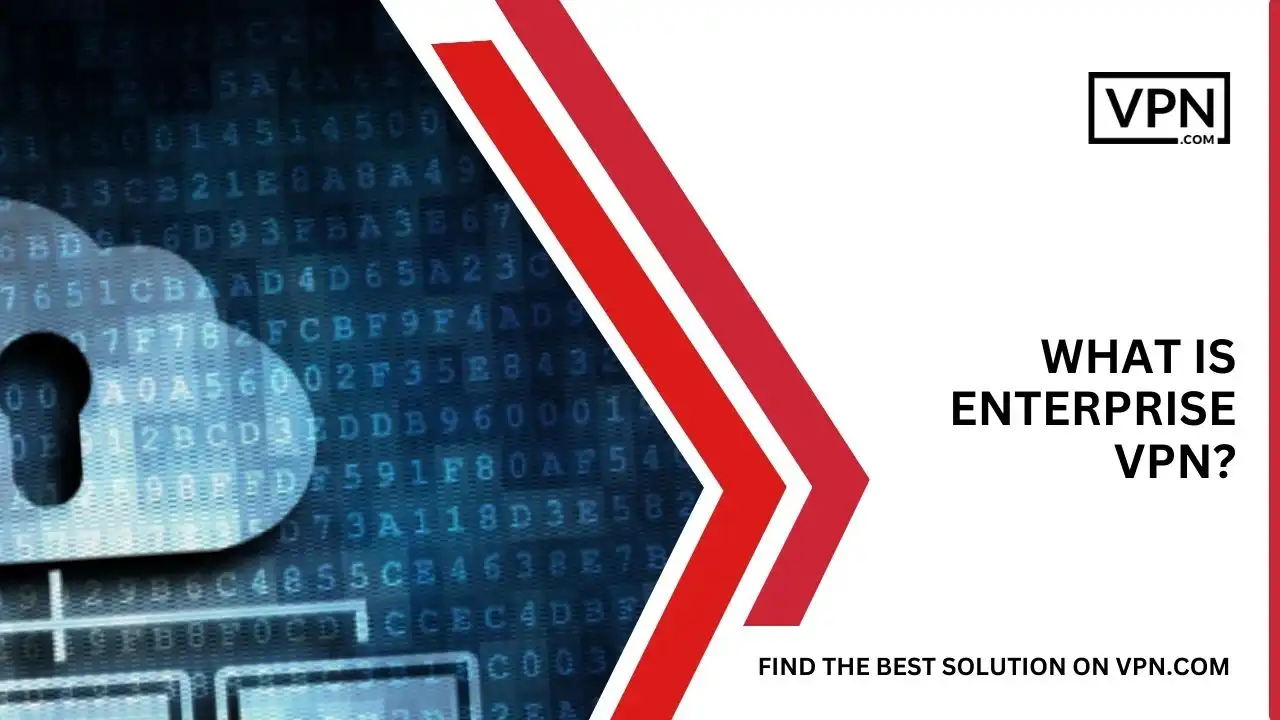
An enterprise VPN is different from a usual VPN. It’s built to protect important company data from outsiders, often referred to as ‘cloud VPNs.’ Their main job is to boost safety for businesses, no matter their size.
This VPN gives remote workers a safe way to connect, especially if they’re using risky or doubtful internet sources. Using this type of VPN, distant employees can use the company’s software they need, but only the ones related to their work.
The big difference when using an enterprise VPN versus a private one is control. The company decides what programs and files an employee can see. The enterprise VPN makes sure remote workers can reach what they need but keeps them away from private details like client info or employee data. On the other hand, private VPNs could let a user see everything.
Top-notch enterprise VPNs work well with popular business tools like Salesforce, Google G-Suite, and Microsoft Azure. This is great for workers at home who once had trouble accessing these tools.
How Does An Enterprise VPN Work?
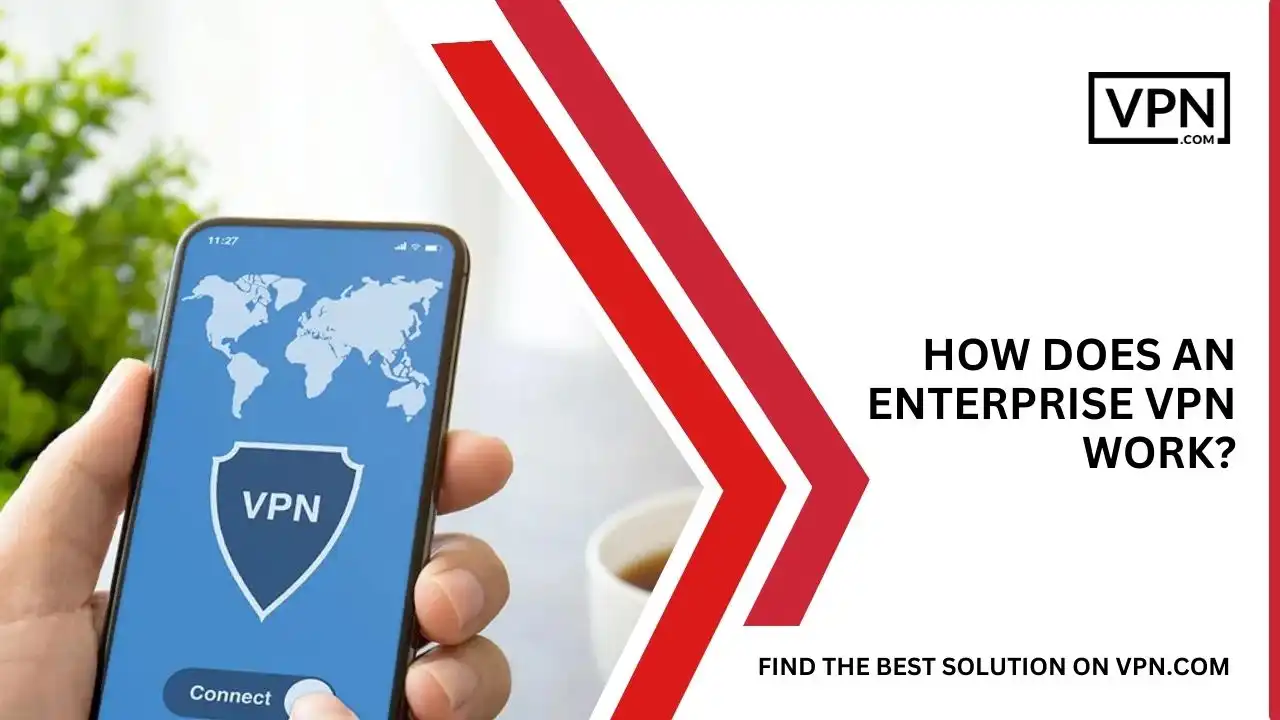
Enterprise VPNs form a safe bridge between a device and the company’s main server, much like standard VPNs. These specialized VPNs ease the stress on IT teams by being cloud-focused and managed by third-party services.
Rather, third-party services manage the VPN ensuring timely updates and fixes. This off-site system lets remote workers conveniently connect from anywhere with the internet.
These VPN services ensure businesses maintain a safe network irrespective of their employee’s location. By initiating security at the company’s side rather than the user’s, businesses can more effectively combat risks and govern access to confidential data.
Some enterprise VPN types even let IT teams pre-set application permissions. Which grants or denies access even before sharing the VPN key with employees.
While both individual and enterprise VPNs offer a private connection between the user and their target. The latter’s security originates from the company, not the individual. Moreover, enterprise VPNs can expand – accommodating a growing number of users without compromising the link between the worker and the main office.
Accessing enterprise VPNs is a great ease for staff. Workers get the designated VPN app which they can launch on various devices. This ensures a protected link even in potentially risky zones like public Wi-Fi areas or via mobile data in public spaces.
Furthermore, enterprise VPNs offer a shield for those using possibly vulnerable home networks. Using robust site-to-site IP security, these VPNs grant user-specific access. These connections accommodate both broader network links and individual remote access. Employees can exchange data securely by minimizing threats of outside interference or harmful software exchanges.
These VPN systems establish encrypted pathways on IP networks ensuring trusted connections between users or between a user and the company. Every connection undergoes thorough validation on both ends. With such VPNs in play accessing cloud storage, exclusive company networks, and varied business tools becomes safer.
IT managers have the authority to set specific guidelines and network regulations across both in-house and cloud-based company networks. These rules then pass safely via the enterprise VPN app.
Moreover, the IT crew retains full network oversight keeping tabs on employee activity. Additional security measures with these VPNs include restricting network access solely to particular IP addresses. It amplifies data protection for the organization.
What Are The 5 Best Enterprise VPN Solutions?
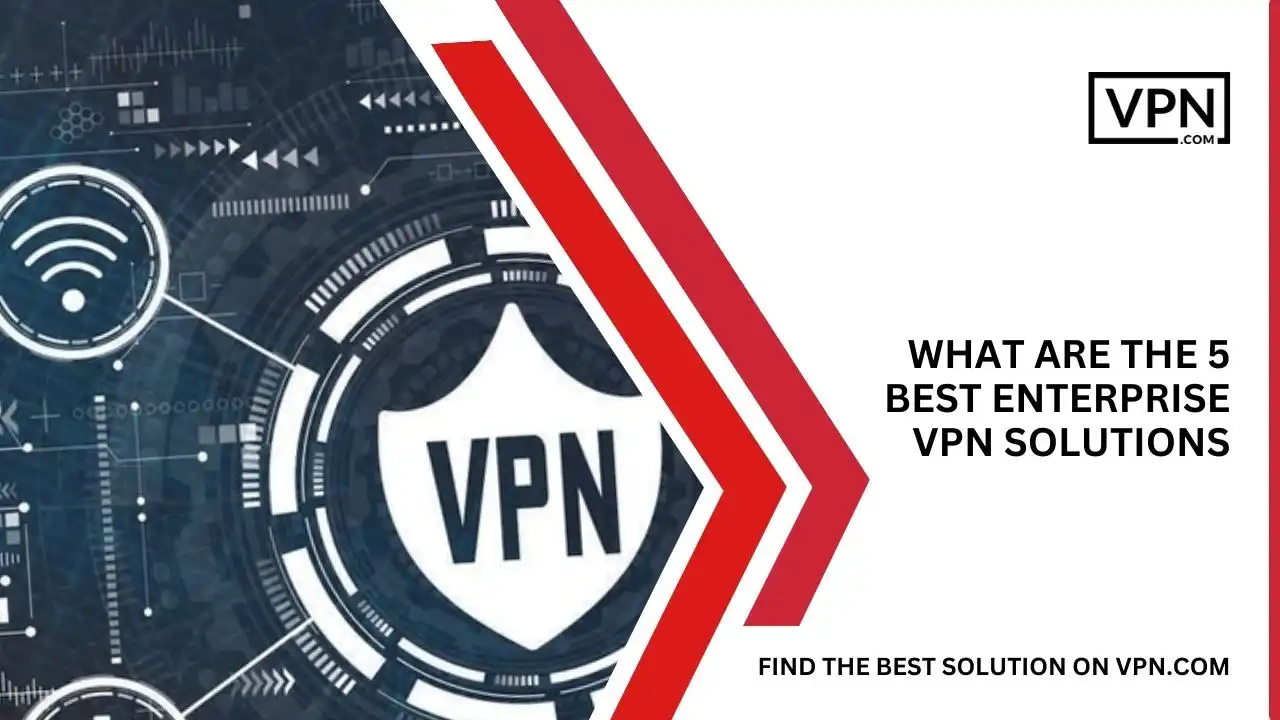
We have narrowed down the research for the best Enterprise VPN for you. Here are the top 5 Best Enterprise VPN Solutions Of 2023:
Cisco AnyConnect
Cisco AnyConnect stands out with its strong security measures, especially its multi-factor authentication. A unique feature is its 24-hour access window; users are automatically logged out after this time, requiring another sign-in for safety.
A highlight of AnyConnect is its rigorous security checks during the login process. It examines the user’s device to ensure it has essentials like protective software or membership to the company’s domain. This guarantees that only company-approved devices access the VPN.
Additionally, AnyConnect can prevent connections to suspicious servers, showcase installed safety tools, and run checks that help with problem-solving. When users are on this VPN, their focus remains solely on work resources, blocking access to local networks or general internet browsing.
Key Features
- Connects users to the company network from any location or device.
- Gives clear information about user device actions.
- Incorporates multiple layers of login checks.
- Ensures users always stay connected.
Advantages
- Straightforward to get and set up.
- Works across various gadgets.
- Excellent support for users.
Drawbacks
- No option to try before buying.
- Missing emergency connection cut-off feature.
Cost
For the exact pricing, it’s best to contact the seller directly.
Fortinet Forticlient
Fortinet Forticlient stands out with its certificate-based integration which gives users both web filtering and firewall options. It is equipped with endpoint security which utilizes smart behavior analysis.
The platform adopts an all-in-one dashboard style which is similar to Checkpoint. It makes tasks like setup, deployment, and client checks straightforward. It also helps spot weak points and updates them swiftly.
Another notable feature is its dual VPN types IPSec and SSL. This flexibility, coupled with its overall security strategy makes it a trusted choice for businesses with remote teams.
Key Features
- Multi-level login checks for added security.
- Supports both SSL and IPSec pathways.
- Built-in guard against malicious software and potential threats.
- Variety of tunnel options, including Point-to-Point, Layer 2, and Secure Socket pathways.
Advantages
- Option to try it out for free.
- Flexible and tailored login settings.
Drawbacks
Merging with virus protection tools can make its operation feel less smooth.
Cost
For detailed pricing, it’s recommended to contact the supplier.
Palo Alto Global Protect
Palo Alto GlobalProtect shares some common features with its contemporaries like multi-factor authentication, amazing security via cookie or certificate checks, web screening, and active threat defense. The best feature is its foundation on Zero Trust principles.
A remarkable feature of GlobalProtect is its sharp device detection. It can distinguish between company-owned devices and those owned by employees. It grants access based on the device’s status.
If a device seems risky or unauthorized then it might get denied access. It’s adept at checking device credentials, software updates, anti-malware status, running apps, and even verifying if data storage is encrypted and backed up properly.
Key Features
- Allows limited access to ensure remote workers only see what they need.
- Multi-level authentication ensures extra security.
- Built-in features to detect and stop potential threats.
- Full insight into all user activities regardless of the app or method they use.
Advantages
- Offers a demo version for users to explore its features.
- Advanced insights into network activities.
- Always stay connected, ensuring a continuous secure link.
Drawbacks
The initial setup might be a bit challenging for newcomers.
Cost
For exact pricing details, it is best to contact the provider directly.
CheckPoint Secure Remote Access
The Checkpoint Secure Remote Access VPN stands out by offering the best installation packages. These packages come with new IP addresses for clients to connect securely. Drawing a comparison to AnyConnect, Checkpoint is fortified with multi-factor authentication. Users can opt for physical tokens or app-based tokens on their smartphones.
Checkpoint takes a firm stance against split tunneling similar to AnyConnect. This means to browse the web users need to set up the company’s specific proxy settings. These settings are strict only allowing access to work-related websites and blocking recreational sites like social media.
Access levels are further fine-tuned through group memberships. Overseeing all these configurations is the Checkpoint firewall, acting as a dual manager for both VPN and firewall settings.
Also, Checkpoint has a special VPN type that connects two distant locations. This ensures smooth data flow between both points.
Features
- Provides a central dashboard for VPN management.
- Supports popular VPN types: IPsec and SSL.
- Features secure hotspot sign-up.
- Enables automatic VPN connections.
- Strengthens security with multi-factor authentication.
Advantages
- The SSL feature means users can access the web without a separate VPN software.
- Includes a tool to check device safety and compliance.
- Compatible with various devices: Windows, Mac, and mobiles.
- Comes equipped with threat detection and blocking.
Drawbacks
- The threat detection feature isn’t available for users on iOS, Android, and Linux.
- In-depth incident reports are exclusive to Windows users.
Cost
For the detailed price structure, it is best to reach out directly to the company.
ZScaler Private Access
ZScaler Private Access stands apart from other solutions discussed in this article. Instead of being a typical VPN for users, it is a cloud service that links users to applications, be it in the cloud or on local systems, through a spread-out structure.
The unique feature here is how applications reach out and connect to approved users with strong encryption. This means users don’t directly tap into the remote networks.
It sets up access rules based on users and their applications. A big selling point for ZScaler is the speed and ease of integrating new acquisitions or mergers because it cuts down on setup time and avoids the need for extra network gear.
Features
- Works on various devices.
- Supports multi-factor authentication for added security.
- Uses AI for smarter network segmentation.
- Allows various segmentation methods, from user-to-app to workload-to-workload.
Advantages
- Users can opt for a demonstration to understand the product.
- Focuses on giving users only the access they truly need for enhanced security.
- Offers tools to ensure the system meets safety standards.
Drawbacks
It operates exclusively in the cloud, which might not suit all businesses.
Cost
ZScaler Private Access provides various packages. For exact pricing, it is best to connect directly with the company.
In short, the top 5 Best Enterprise VPN Solutions for 2023 are Cisco AnyConnect, Fortinet Forticlient, Palo Alto GlobalProtect, CheckPoint Secure Remote Access, and ZScaler Private Access.
Is It Safe To Use Free Enterprise VPN?
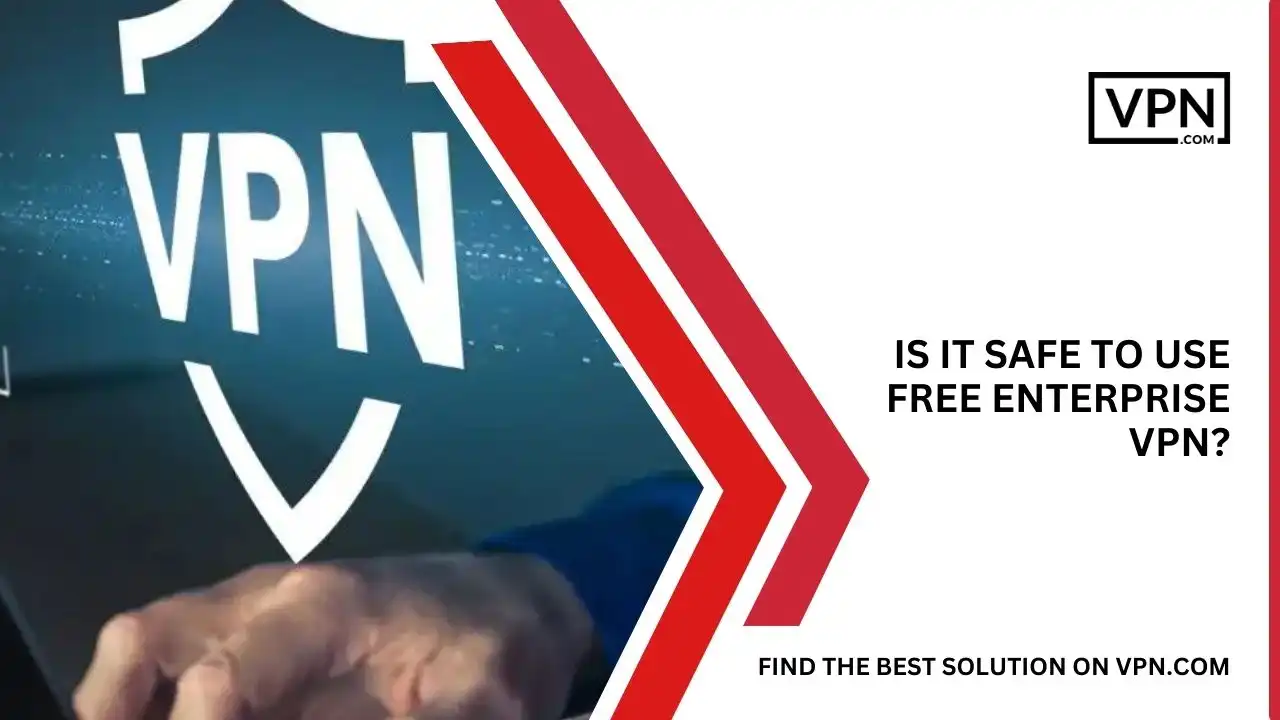
With subscription-based VPN, you know the fees are covering the service costs. Free VPNs might offset their expenses by selling user data to other companies like advertisers. Paid VPNs offer better quality, faster speeds, and enhanced security.
Generally, if you invest in a paid VPN then you are likely to experience better quality, faster speeds, and enhanced security. For many businesses, speed is a deal-breaker. A laggy VPN can disrupt online meetings which makes video calls and presentations a challenge.
Another downside to free VPNs is the limited number of servers. With fewer servers, you have fewer connection choices and limited options for selecting your online location. This becomes crucial for businesses with teams in countries where the internet is heavily censored or certain sites are off-limits.
Using a VPN can help bypass these restrictions. However, there is a catch. Some free VPNs might trade user data even with governments. In countries with strict surveillance, ensuring company confidentiality can be tough. However a secure enterprise VPN can minimize the risks of unwanted snooping.
Conclusion
While we present the top 5 Best Enterprise VPN Solutions for your selection. It is important to note that the absence of other VPNs here doesn’t imply their inferiority.
These systems focus on data security and their designers take this responsibility seriously. Hence you will not be kept in the dark. The key distinction lies in the priorities each VPN addresses.
As you make your choice, prioritize your security requirements taking into account factors like compatibility and cost. We hope we have guided you the best. However, if you still have any questions to ask us then feel free to ask.
Customer Reviews for NordVPN: In-Depth Review, Tests, and Stats

Connection issues with MLB.TV
May, 2 2023

Prompt customer service
May, 6 2023

I would highly recommend
December, 15 2023
Top Enterprise VPN Solutions
VPN Service
Features
Rating
Visit Site

- Manage accounts & oversee activity from the control panel
- Full suite of next-gen security features
- Dedicated account management
- Flexible plans w/ monthly & annual billing options
- 24/7 dedicated support

- Easily manage teams of 5,000+ with one account
- Content filtering blocks unproductive distractions
- Private servers & endpoints available
- Price per user decreases as team grows
- 24/7 live chat support

- Simple, unified management portal
- Private servers and static IPs come standard
- Free demo available
- Flexible plans w/ monthly & annual billing options
- 24/7 live chat support

- Dedicated account management
- Private servers & static IPs available
- Chameleon protocol bypasses VPN blocking
- Free trial available
- 24/7 Tier 1 & 2 support





